

Grand Challenges in Global Health. ニッポンの ジレンマ. 震災の年から 希望の年へ. 【第1回ジレンマ×ジレンマ】 決められない日本 民主主義の限界? 僕らの救国の 教育論. 僕らの楽しい 資本主義. 僕らの 国際関係論. SCIEMENT. SCIEMENT. 星海社. ジセダイ. ミリオンセラー タイトルズ. Peter Molyneux. Career[edit] Early career[edit] Peter Molyneux began his career in 1982 by distributing and selling floppy disks which contained video games for Atari and the Commodore 64.
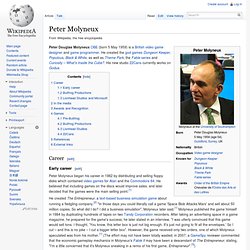
He believed that including games on the discs would improve sales, and later decided that the games were the main selling point.[1] He created The Entrepreneur, a text-based business simulation game about running a fledgling company.[2] "In those days you could literally call a game 'Space Blob Attacks Mars' and sell about 50 million copies. So what did I do? Due to the game's failure, Molyneux retreated from game design, and started Taurus Impex Limited—a company that exported baked beans to the Middle East[4][5] —with his business partner Les Edgar. Bullfrog Productions[edit] Using money earned from the database program, Molyneux and Les Edgar founded Bullfrog Productions in 1987.[1][6] Molyneux provided the original concept for Populous, the first god game for the personal computer. Black and White 2.
"Fully re-mastered with HD visuals and audio, a stunning rendition of the original game that will delight faithful fans and new players alike!
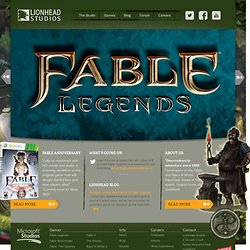
" "Coming soon to Xbox 360! " "Doormakers to adventure since 1996" Developers of the Fable and Black & White franchises based in the quaint, English town of Guildford. Populous. The Populous series is a series of video games developed by Bullfrog Productions and published by Electronic Arts.
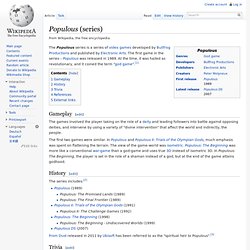
The first game in the series – Populous was released in 1989. At the time, it was hailed as revolutionary, and it coined the term "god game".[1] The games involved the player taking on the role of a deity and leading followers into battle against opposing deities, and intervene by using a variety of "divine intervention" that affect the world and indirectly, the people.
The first two games were similar. In Populous and Populous II: Trials of the Olympian Gods, much emphasis was spent on flattening the terrain. Fable2. "Fully re-mastered with HD visuals and audio, a stunning rendition of the original game that will delight faithful fans and new players alike!
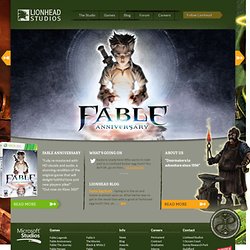
" "Out now on Xbox 360! " Easter's nearly here! Who wants to take part in a Lionhead Easter egg hunt? You do?! Oh, go on then... bit.ly/QlyvQN Easter Egg Hunt! Gapminder. LightSail Energy. LightSail Khosla Ventures. 30 Under 30: Energy. Greening the Grid. RepRap. TEDxEWB Talk: Adrian Bowyer at Imperial College, London, introduces RepRap RepRap is humanity's first general-purpose self-replicating manufacturing machine.
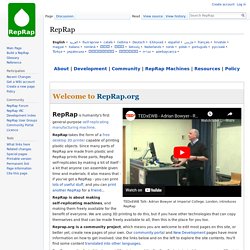
RepRap takes the form of a free desktop 3D printer capable of printing plastic objects. Since many parts of RepRap are made from plastic and RepRap prints those parts, RepRap self-replicates by making a kit of itself - a kit that anyone can assemble given time and materials. It also means that - if you've got a RepRap - you can print lots of useful stuff, and you can print another RepRap for a friend... RepRap is about making self-replicating machines, and making them freely available for the benefit of everyone.
Reprap.org is a community project, which means you are welcome to edit most pages on this site, or better yet, create new pages of your own. RepRap Project. RepRap version 1.0 (Darwin) RepRap version 2.0 (Mendel) First part ever made by a Reprap to make a Reprap, fabricated by the Zaphod prototype, by Vik Olliver (2006/09/13) The RepRap project is a British initiative to develop a 3D printer that can print most of its own components.[1] RepRap (short for replicating rapid prototyper) uses an additive manufacturing technique called Fused filament fabrication (FFF) to lay down material in layers; a plastic filament or metal wire is unwound from a coil and supplies material to produce a part.
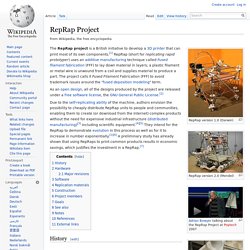
The project calls it Fused Filament Fabrication (FFF) to avoid trademark issues around the "fused deposition modeling" term. As an open design, all of the designs produced by the project are released under a free software license, the GNU General Public License.[2] History[edit] Thingiverse. Reprap products. Movement to New Industrial Revolution. One voice Campaign. Democracy. Mars One Project. 福島第一原発 観光地化計画. Khan Academy. Education.